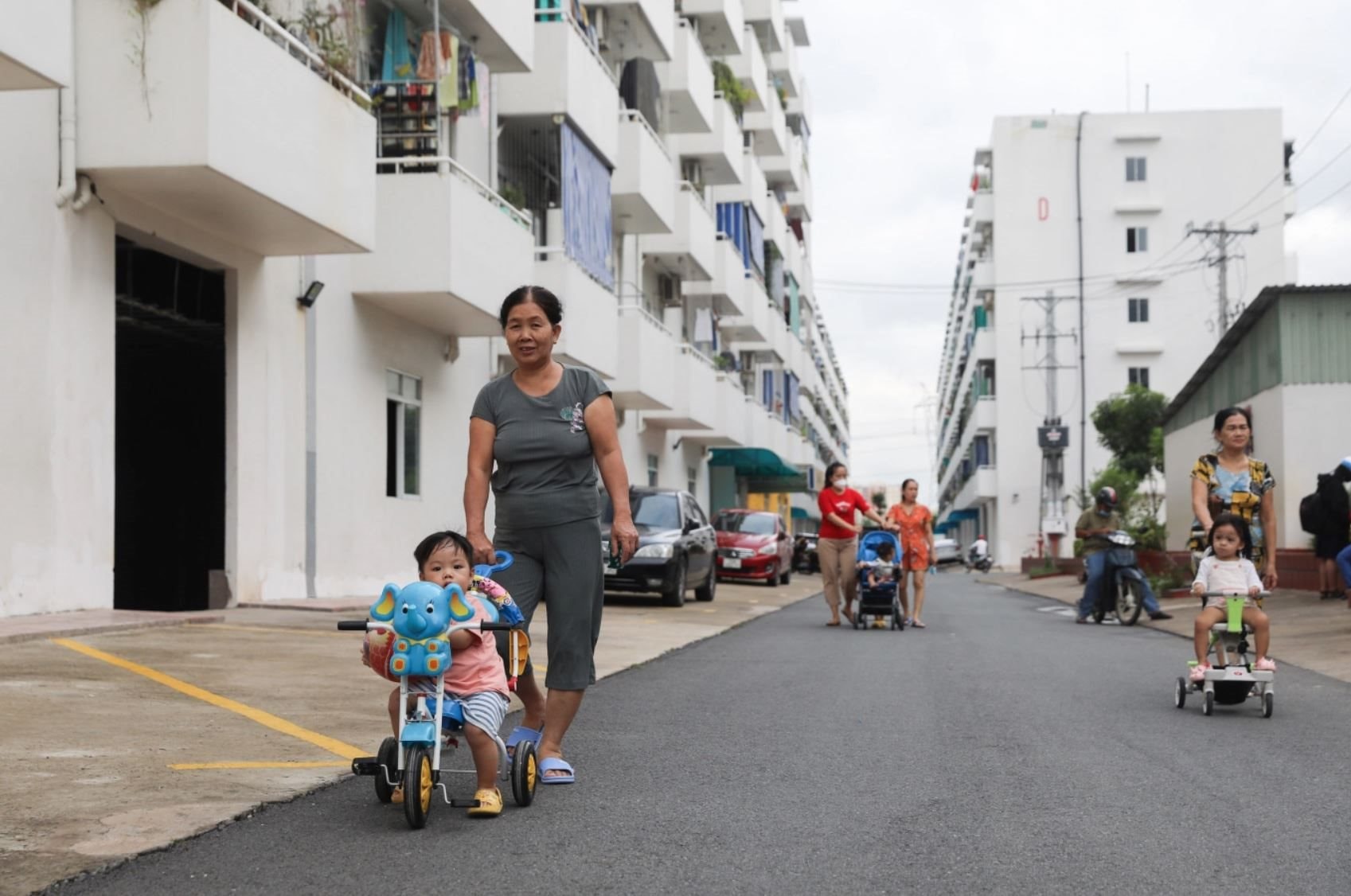
During the discussion on the draft resolution on piloting special policies for social housing development on May 24, Deputy Ta Van Ha, Vice Chairman of the Committee for Culture, Education, Youth, and Children, predicted that after the completion of the province-city merger, the demand for social housing would increase. However, due to limited supply, housing prices remain too high compared to the income of those eligible to purchase social housing.
“25 million VND per square meter is very difficult for low-income earners of 15 million VND or less. Similarly, the current rental price of 200,000 VND per square meter means a 30-square-meter house costs 6 million VND per month,” said Deputy Ta Van Ha.
According to Deputy Ha, those in need of social housing are mainly young workers who have just graduated. With low incomes and unstable jobs, they face challenges in accessing housing. Therefore, there is a need to increase the construction of social housing projects for rent. The government should implement supportive policies to help these workers actually access rental housing at affordable prices.

The selling price of social housing in large cities is tending to increase, far exceeding the average income of most workers. Illustration.
Sharing this view, Deputy Nguyen Hoang Bao Tran, Vice President of the Labor Confederation of Binh Duong province, said that all workers dream of owning a small house to settle down and work peacefully.
However, looking at the real estate market and the continuously rising consumption and income levels, the hope of owning social housing seems out of reach for them.
“The Housing Law has issued policies, but with a monthly income of around 10 million VND, along with expenses for food, children’s education, hospital fees, utilities, and rent, accessing social housing is beyond reach,” said Ms. Tran.
In addition, the criteria, procedures, and approval processes are not designed for low-income earners. Many people want to register but have to give up because they do not meet the requirements or are afraid of adding more debt to their already struggling lives, according to Ms. Tran.
Therefore, Deputy Nguyen Hoang Bao Tran proposed that the National Assembly consider supplementing practical support mechanisms such as price subsidies or price support from the state budget or the national housing fund to ensure that the selling and rental prices are commensurate with the actual income of workers. The drafting agency should also supplement regulations on the price ceiling or floor for social housing according to each region.
The female deputy also proposed a mechanism to differentiate between regions with varying demands for social housing. The draft should classify localities into groups with high, medium, and low demand based on population density to allocate appropriate fund sources and avoid spreading resources too thin.
Deputy Thach Phuoc Binh, from Tra Vinh province, said that the selling and rental prices of social housing are not really reasonable. Although the law stipulates that land use fees should not be included in the selling price of social housing, in reality, the selling price is still high and unaffordable for many workers. The reason, according to the deputy, is the ineffective mechanism for controlling the selling price.
Mr. Binh cited an example of a social housing project in some major cities, where the price is nearly 25 million VND per square meter, which is higher than the payment capacity of most workers. There is a lack of control over the transfer of social housing, and some loopholes in the conditions and period of transfer have led to the emergence of policy exploitation and sophisticated speculation in social housing. In addition, the report of the State Audit Office in 2022 also pointed out signs of inflated costs in social housing prices in some localities.
Therefore, Deputy Thach Phuoc Binh suggested that the draft supplement a mechanism to transparentize the process of determining the selling price, strengthen independent supervision to ensure that the investment cost and beneficiaries are accurate. Specifically, it is necessary to mandatorily publish the selling and rental price plans for social housing on the provincial portal, and get feedback from the community and workers before approval.
According to the plan, the National Assembly will approve the Resolution on piloting a number of mechanisms and policies for social housing development on June 29, the last day of the session.
“Affordable Housing Remains an Elusive Dream for Many Workers”
“Access to social housing remains a challenge for workers due to difficulties in saving, limited supply, and complex procedures.”
“Ensuring Equal Access: The Prime Minister’s Meeting with Vingroup and Sungroup Leaders”
The Prime Minister has taken a firm stance against any manipulative practices in the real estate market. He has directed authorities to take stringent action against those who engage in price manipulation, speculation, market rigging, and profiteering, ensuring that such malicious activities are eradicated from the industry.
Streamlined Reform Proposal: Slashing Red Tape from 300 to 75 Days to Salvage Social Housing Plans
“The current process of selecting a social housing investor through a tender process takes an average of 300 days, a lengthy and cumbersome procedure. However, with the implementation of proposed reforms, this duration could be significantly reduced to just 75 days. This radical transformation will streamline the process, making it more efficient and accessible for all involved parties.”
A Bold Reform Proposal: Slashing Processing Time from 300 to 75 Days to Revitalize Social Housing Projects
“The current process of selecting a social housing project investor through a tender process takes an average of 300 days, a lengthy and cumbersome procedure. However, with the implementation of proposed reforms, this duration can be significantly reduced to just 75 days. This radical transformation will not only streamline the process but also open up opportunities for efficient and effective project development, ensuring timely delivery of much-needed social housing initiatives.”










![[Photo Essay]: Experts, Managers, and Businesses Unite to Forge a Path Towards Sustainable Green Industry](https://xe.today/wp-content/uploads/2025/07/z678592918-150x150.jpg)


![[Photo Essay]: Experts, Managers, and Businesses Unite to Forge a Path Towards Sustainable Green Industry](https://xe.today/wp-content/uploads/2025/07/z678592918-100x70.jpg)







